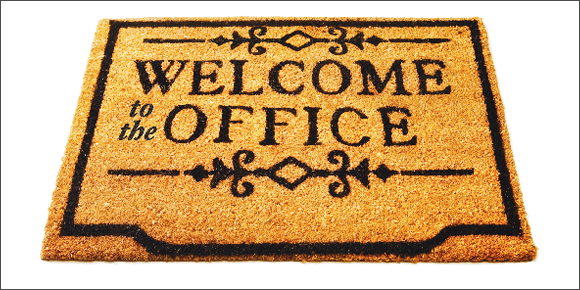More and more professional REALTORS® are working from home. Here’s what you need to know about setting up a home office for maximum productivity.
By James Cappio
The Killer App
“Cloud” services (file-sharing services that allow a user to sync and share files on a variety of devices) may be the most useful innovation going for home-office workers. There are many competing cloud services, but Dropbox is the clear favorite. Successful REALTORS® with home offices use Dropbox in many ways. Rod Tuazon says that with the use of his scanner and Dropbox, he has implemented the long-sought ideal of the paperless office — so much so that he shreds his hard-copy documents after a closing: “I wouldn’t be able to make my home office work” without the combination of a scanner and Dropbox. Marsha Sell uses it to transmit documents between her home office and her outside office. Marylea Todd says: “I’m able to work in partnership with my daughter, who is based in a different town, because Dropbox permits us to share documents seamlessly.”
According to a 2014 New York Times article, the telecommuting population rose 79 percent between 2005 and 2012. The Census Bureau’s American Community Survey, which the Times story relies on, doesn’t break out occupations any more finely than “finance, insurance, real estate, rental, and housing,” so we can’t tell how many REALTORS® are telecommuting, but there is no doubt they are sharing in that increase.
There’s a lot to recommend working from home. Marylea Todd, CRS, CIPS, of Prudential California Realty in Brea, California, has had a home office for over 10 years and uses the brokerage office only for client and company meetings. She says, “I’m more productive without the coffee-pot complainers and the broken copy machines.” Marsha Sell, a CRS and e-PRO in Marietta, Georgia, revels in the convenience of having access to all of her documents 24/7. “A home office means I don’t have to go out in the middle of the night to retrieve a file.”
But all this comes with a caveat: To be productive in a home office, you need the right setup, the right equipment and the right attitude.
Find a Dedicated Space
Avoiding distractions is crucial to working productively at home. Having a dedicated room for the home office seems to be a key to making it work. Lori Peters, CRS, ABR, at Windemere/RE Valley in Spokane, Washington, says “It’s important to have a door you can close.” Marsha Sell incorporated a home office with built-in shelves and filing space when building her current house. Rod Tuazon, CRS, of Troop Real Estate in Ventura, California, notes that in addition to avoiding distractions, a dedicated private home office space is essential if you want to hold client meetings.
It’s equally important to avoid distractions at the computer. For those who are too easily diverted by Facebook and Twitter, there are programs that can block the Internet on your computer, of which the best known is probably Freedom (basic plan: free).
Be Tech Savvy
Much of the office tech you’ll need is obvious. But in addition to a computer, printer (laser for documents, plus color if you send out brochures, as Rod Tuazon does), and a fast and reliable Internet connection, many successful work-at-home REALTORS® have deployed other hardware.
An iPad or other tablet can have important uses, especially on the road. For example, Rod Tuazon uses Visual Tour to give clients a virtual tour of properties. Marylea Todd brings hers to client meetings, which, as she says, “the younger generation prefers to have at a Starbucks.”
The most useful tool, perhaps surprisingly, turns out to be a scanner. According to Marsha Sell, “the best investment I ever made in office equipment is my compact Fujitsu scanner.” Scanning documents allows for easier storage, better protection against loss (with a backup, of course) and perhaps most important, the ability to integrate with other technology such as electronic signatures and file-sharing services such as Dropbox.
In addition, software designed especially for REALTORS® can be very helpful in the home office. For example, Marylea Todd relies on SharperAgent for contact management; Rod Tuazon uses Top Producer for the same purpose.
The Need for Discipline
The flexibility and convenience of a home office make it an ideal work arrangement for those who have the discipline to make it work. Contrary to the opinions of many home-office gurus, it’s not necessary to keep business hours—night owls like Marsha Sell do just fine—but it is necessary to put in a full work day. That means no binge-watching favorite TV shows; as Rod Tuazon mischievously puts it, “block in some time for work.” Just as in a regular office, REALTORS® who can keep that focus will flourish.
Elementary Deductions
As Rod Tuazon observes, “Many REALTORS® are either not aware of the home-office deduction or don’t take it,” perhaps because they think it’s a “red flag” to the IRS. In recent years, though, the red flag issue has become less of a problem. In fact, last year the IRS introduced a “simplified option” for returns filed beginning in 2014, a flat deduction of $5 per square foot of office space to a maximum of 300 square feet, or $1,500. If instead you want to take the deduction by the old-fashioned “regular method,” there are two key requirements:
- You must regularly use part of your home exclusively for conducting business.
- You must show that you use your home as your principal place of business, i.e., that you conduct business “substantially and regularly” there.
There are extra requirements if you are not self-employed. If you meet the requirements, you can deduct a percentage of your rent or mortgage, as well as other business expenses (such as a phone line used exclusively for business) based on the percentage of your home used for business.
The IRS doesn’t require any particular method or recordkeeping, but suggests that you keep checks, receipts and other evidence of business expenses. Your records must show your expenses and depreciation, as well as how you meet the requirements for taking the deduction.
If you want to take the deduction, consult with your tax adviser about your eligibility and the requirements.
For more information, read The Home Office that Works — 2015 edition, available at Amazon.








